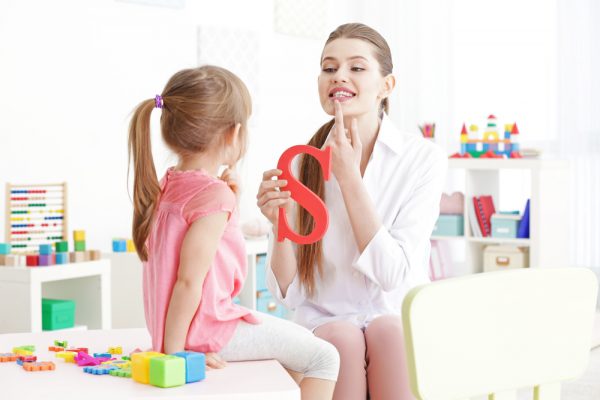How to help your child use more words and sentences
We see lots of children who are understanding what is being said to them, but are not yet using many words. Here are a few ideas to encourage children to begin using spoken words and phrases.
How can I help my child to use words?
Get face to face – when playing with your child always try to be at their eye level so they can see your face and how you make the words. It also helps us to see what they are interested in. Try to be face to face whenever possible, crouch down in front of the pushchair, sit by the side of the bath, look at books facing one another.
Use gesture, facial expression and intonation – often some of the first words children learn are “bye,” “oh no,” and “oh dear.” This is because we exaggerate these words and introduce actions to make them stand out. We can do this with other words too. Use lots of fun sounds and words during play, e.g. ‘choo choo,’ ‘baa,’ ‘wee,’ etc. and add in gestures where you can.
Keep it simple – to pick up individual words children need to hear them in simple phrases. If your child is not yet using many words try using 1-2 word phrases, e.g. “book,” “yummy carrots,” “big train.” If your child has started putting words together then try talking in simple sentences, e.g. “Daddy’s drinking tea,” “the bear is hungry.”
Use real life and real objects – children learn best when they involve all their senses (sight, touch, hearing, smell, taste). When introducing new words try to show them in a variety of contexts, e.g. if you want your child to learn the word “boat” you could go and see some boats in the harbour, play with a toy boat in the bath and read a book about boats.
Repetition – children need to hear words many times before they are able to say them. Try to repeat key words at least 5 times during an activity, repeat familiar songs and read the same books again and again.
How can I help my child link words together?
Use a variety of words – children will often learn object words first, e.g. ball, car, biscuit. In order to start linking words they need to learn different types of words that fit together. When talking with your child try to talk about actions (running, splashing, pushing), describing words (yummy, dirty, beautiful, red), words for location (in, on, behind) and words for feelings (hungry, sad, funny). When children can say between 10 and 50 words they will usually start to combine them, e.g. “mummy splash;” “big bus.”
Expand on what your child says – if your child says 1 word (e.g. ball) try to add another word to it (e.g. “big ball”). If they say 2,3 or 4 words (e.g. “Mummy make cake”) add another 1/2 words to extend their sentence (“mummy’s making a big chocolate cake”).
Use lots of comments and less questions – it can be tempting to ask your child lots of questions to encourage them to use words, but this can be counterproductive. Children need to hear us using language so they know how to put words together. Try to make comments about what your child is doing rather than asking a question, e.g. instead of asking “what are you doing?” you could say “you are pushing the train;” “it is going through the tunnel.”
How many words should my child by able to say?
| By 18 months | Can use up to 20 simple words, such as ‘cup’, ‘daddy’ ‘dog’. These words may not always be clear. |
| By 2 years old | Can use 50 or more single words and are beginning to put short sentences together with 2-3 words, e.g. “more juice” or “bye nanny.” |
| By 3 years old | Can use up to 300 words and put 4 -5 words together to make sentences, e.g. ‘want more juice;’ ‘he took my ball’.
Can ask lots of questions and will use different types of words including objects, actions and concepts (big, red, empty). Starting to use simple plurals by adding ‘s’, for example ‘shoes’ or ‘cars’. |
| By 4 years old | Use longer sentences and link sentences together, e.g. “we went to the park and I played on the swings.”
They can describe events that have already happened and can answer questions about ‘why’ something has happened. May still make mistakes with tense such as say ‘runned’ for ‘ran’ and ‘swimmed’ for ‘swam’. |
If you are concerned that your child is not yet using enough words/sentences for their age you can seek advice from a Speech and Language Therapist.



